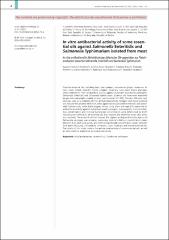| dc.description.abstract | Fourteen essential oils, including basil, black pepper, cassumunar ginger, cinnamon, lemon, clove, fennel, lavender, myrtle, oregano, rosemary, curry plant, thyme and sage,
were screened for their antibacterial activity against important food-borne pathogens,
Salmonella Enteritidis and Salmonella Typhimurium. Essential oils have been examined
by gas chromatograph coupled to mass spectrometer (GC-MS). The disc diffusion method was used as a screening test for antibacterial activity. Oregano and thyme essential
oils showed the greatest inhibition zones against both Salmonella Enteritidis and Salmonella Typhimurium, while black pepper, lemon, curry plant and sage EOs expressed no
antibacterial activity against tested Salmonella serotypes. Subsequently, minimal inhibitory concentration and minimal bactericidal concentration were determined by broth
microdilution method for all essential oils that showed any inhibition zones (disc diffusion method). The essential oil that showed the highest antibacterial activity against all
Salmonella serotypes was oregano, expressing minimal inhibitory concentration values
between 0.04 and 0.23 µL/mL, and minimal bactericidal concentration values between
0.09 and 0.45 µL/mL, followed by cinnamon, clove, rosemary and thyme essential oils.
The results of this study confirm the antibacterial activity of some essential oils, as well
as their potential application as food preservatives. | en_US |

